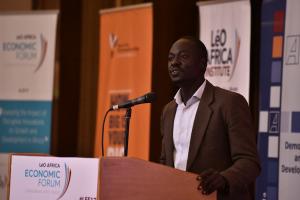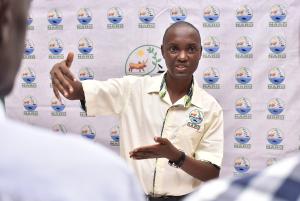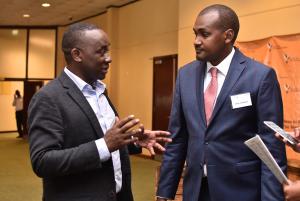Event reports
The Forum, held under the theme; “Assessing the Impact of Disruptive Innovations on Growth and Development” brought together over 200 innovators, entrepreneurs and thought leaders from both the public and private sectors to explore opportunities for harnessing innovative technologies to create more inclusive and job-creating economies.
Opening the 2017 Forum, Awel Uwihanganye, the founder and senior Director of the LéO Africa Institute - organizers of the annual event - warned that Africa could not afford innovating based on the Western model that has led to automated systems replacing human effort in production and created vast profits for an exclusive class, while neglecting vast numbers of ordinary citizens. “The drive for innovative solutions for Africa cannot afford to adopt this approach, for a region with 50% of global poverty. It must offer solutions to the most pressing problems or needs of the people in critical areas such as health, education, finance or even recreation,” he warned.
Officiating at the Forum, ICT minister Frank Tumwebaze applauded its theme, but hastened to warn that “It's important that we always simplify these ICT terms coached from tech labs and environments so as to be understood by everybody, such that we don't speak to ourselves only as ICT practitioners and innovators.” He challenged innovators to come up with society-relevant innovations, pledging that government is willing to supporting ICTs and associated innovations that demonstrate tangible benefits to GDP growth, employment creation and the transformation of society. “If our innovators are to remain indispensable to the future, they must set out to understand the needs and challenges of society, and innovate solutions that will go beyond expos to transform how we live,” he said.
The discussion that oscillated between key note presentations, panel discussions, and plenary interactions also highlighted the need to revamp our school curricula, to adjust them to the challenges of the present and the needs of the future. “We must revise our school curricula to make them encouraging of creativity in learning and enable our children to grow into independent minded, questioning and critical thinking individuals. These facets are crucial for tapping into the opportunities and dynamism of today’s technologically orientated world,” rallied Donnas Ojok, the programmes officer at the Konrad Adenauer Stiftung, in his keynote presentation that ushered in afternoon half of the day-long conversation.
In a master class session held on the sidelines of the Forum, Arnold Kwizera, the Media Relations Manager for the African Institute for Mathematical Sciences, underscored the importance of science education in schools, noting that the training is a critical enabler of innovation. “The World Economic Forum predicts that by 2020, 85 million of the world’s jobs will be in the field of STEM (Science, Technology, Entrepreneurship and Mathematics), and Africa will need a new generation of engineers, tech-experts and researchers,” he said. “How we get there is by encouraging Education in STEM from an early age,” he concluded.
Currently, 40% of researchers working in Africa are non-local and the continent loses $4billion annually hiring experts to work in STEM related fields, according to the World Economic Forum.
Arguably the biggest challenge hindering the breakthrough of innovations and start-ups into marketable ventures is their inability to attract capital. To this, the Forum emphasized the need for public–private partnerships between government and already existing hubs, as one way of being to attract more private sector investment. “The Innovation Village missed out on a $6 million dollar grant because it didn’t have any history working with government,” noted Japheth Kawanguzi, the proprietor of the Innovation Village, one of the biggest Innovation hubs in Kampala.
With emerging innovations threatening present-day business models and eroding already scarce job opportunities, the Forum’s last panel discussed how businesses were coping with these disruptions. Patrick Mweheire, Stanbic Bank CEO, argued that businesses must continue thinking of new and easier ways to connect to and relate with their clients and customers. “At Stanbic for example, we’re not responding to Technology by laying off workers. Instead, we’re training our staff to adapt and better utilize these technologies in the service of our customers,” he said.
Closing the Forum, LéO Africa Institute’s Board Member William Babigumira commended the Institute for continuously convening such Forums, and for deliberately involving young people, “who’re the future of these economies,” in the conversations. The Forum was organized by the LéO Africa Institute, in partnership with the Konrad Adenauer Stiftung and NBS Television, supported by the National Agricultural Research Organisation (NARO), The Innovation Village, and On-line News Site ChimpReports.







